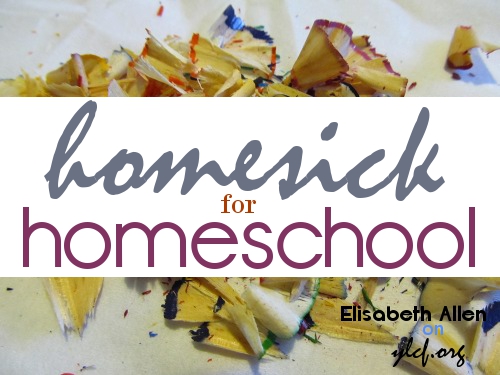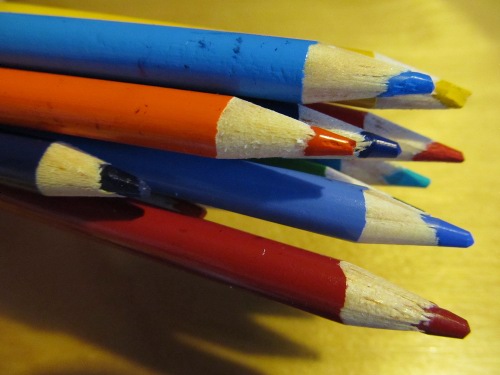homesick for homeschool
There are certain things that make me homesick for homeschool. I “graduated” when I was sixteen. It’s twelve years since I was a homeschool student. A set of crayons or a pile of books or a shelf of files, however, still make me want to study.

My parents started homeschooling me in the early eighties. In those days, in England, only a handful of families homeschooled. The ones who lived in our part of the country tended to be the kind who cherished an alternative approach to everything — including education. They found my parents’ approach to homeschool too religious and too structured. In spite of that fact, however, my parents were very relaxed in their approach to homeschool. Their goal was to teach their children The Three Rs — “Reading, wRiting and aRithmatic” — and the skills to access whatever information (or education) they wanted.
Learning to read was one of the hardest things I’ve done to date, for some reason, but my parents ensured that I persevered and I haven’t stopped reading since I finished my reading scheme at the age of seven or so. Learning to write was hard, too, but I really enjoyed writing exercises and would sometimes make excuses to write more. I hated math, but learned the basics, in spite of being numerically challenged to this day.
Homeschool was never about reading and writing and arithmatic alone. It was about growing some flowers from seed in the garden, walking and running and climbing for miles on the moors, helping with lambing on a friends’ farm. It was about planting a bean in a jar of soft cotton wool and watching, through the glass, as it sprouted. It was about visiting historical sights and seeing for ourselves Buckingham Palace where the Queen lives and the Houses of Parliament where laws are made. It was an impulsive trip to Paris for a weekend and a spontaneous decision to live for three weeks in Illinois.My parents used a curriculum for math and for English. For everything else they purchased and borrowed books. Hundreds of books. Books about everything from the structure of the language to the history of the country to the geography of the world. Books from Abeka (the mid-seventies editions of Health, Safety and Manners anyone?) and Oxford University Press. Fact books and fiction books that grew my mind and my heart and even my soul.
In that respect, homeschool was a global affair, as well as a communal affair. My grandparents contributed a reading scheme to our library of books. My parents taught me how to read widely and think deeply. My mother’s best friend was a qualified teacher. She took me a step further and taught me how to engage with texts that I didn’t like or disagreed with for some reason. My sisters and I played creatively for hours over the years with her children and other friends, learning together from the books we’d read and our imaginations, with a bit of help from our gardens and boxes of dressing up clothes.
At home, my parents let my sisters and I study wherever we wanted, as long as lessons were studied and assignments were completed. My favourite place to study, however, was the kitchen table. I’d spread my books and papers and pencils all over the table. My parents loved classical music and there was usually a sonata by Mozart playing in the background. I’d read while kicking the legs of my chair. I’d write while chewing my pencil. I’d ask endless questions while bouncing up and down on my chair and drawing pictures of whatever I was fascinated by at the moment.
I know, now, that homeschooling isn’t right for every family or every child, but it was right for me and I hope it will be right for my future children, because I have countless happy memories of homeschool.

